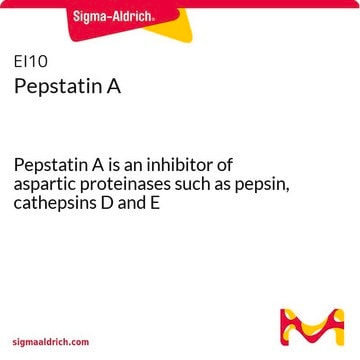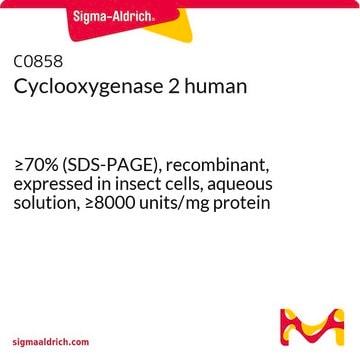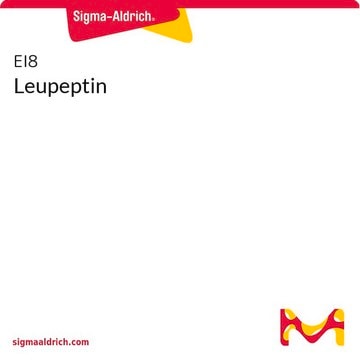516483
Pepstatin A, Penetratin
A Pepstatin A that is ~75% less potent against Cathespins D/E than PepA in cell-free assays.
Sinónimos:
Pepstatin A, Penetratin, PepA-RQIKIWFQNRRMKWKK-OH, PepA-Antp₄₃₋₅₈
Iniciar sesiónpara Ver la Fijación de precios por contrato y de la organización
About This Item
Fórmula empírica (notación de Hill):
C138H229N39O28S
Peso molecular:
2914.60
UNSPSC Code:
12352202
NACRES:
NA.77
Productos recomendados
Quality Level
assay
≥97% (HPLC)
form
lyophilized solid
manufacturer/tradename
Calbiochem®
storage condition
OK to freeze
desiccated (hygroscopic)
protect from light
color
white
solubility
water: 1 mg/mL
shipped in
wet ice
storage temp.
−20°C
General description
A Pepstatin A (PepA; Cat. No. 516481) penetratin (pAntp43-58) conjugate (PepA-P) that is ~75% less potent against Cathespins D/E (IC50 = 920 nM) than PepA in cell-free assays, presumably due to its decreased solubility. However, with its enhanced permeability, PepA-P is much more active than PepA in inhibiting cellular aspartic protease activity in MCF7 (94.1% vs. 54.6% inhibition wtih 10 µM respective compound), Boleths, and Dendritic cultures. PepA-P, but not PepA, effectively interferes with antigen processing by primary APCs and the subsequent activation of antigen-specific memory T cells.
Packaging
Packaged under inert gas
Warning
Toxicity: Standard Handling (A)
Sequence
PepA-Arg-Gln-Ile-Lys-Ile-Trp-Phe-Gln-Asn-Arg-Arg-Met-Lys-Trp-Lys-Lys-CO₂H
Physical form
Supplied as a trifluoroacetate salt.
Reconstitution
Following reconstitution, aliquot and freeze (-20°C). Stock solutions are stable for up to 3 months at -20°C.
Other Notes
Zaidi, N., et al. 2007. Biochem. Biophys. Res. Commun.364, 243.
Legal Information
CALBIOCHEM is a registered trademark of Merck KGaA, Darmstadt, Germany
Storage Class
11 - Combustible Solids
wgk_germany
WGK 1
flash_point_f
Not applicable
flash_point_c
Not applicable
Certificados de análisis (COA)
Busque Certificados de análisis (COA) introduciendo el número de lote del producto. Los números de lote se encuentran en la etiqueta del producto después de las palabras «Lot» o «Batch»
¿Ya tiene este producto?
Encuentre la documentación para los productos que ha comprado recientemente en la Biblioteca de documentos.
Adrienn Skopál et al.
The Journal of biological chemistry, 298(5), 101888-101888 (2022-04-04)
Adenosine A2A receptor (A2AR)-dependent signaling in macrophages plays a key role in the regulation of inflammation. However, the processes regulating A2AR targeting to the cell surface and degradation in macrophages are incompletely understood. For example, the C-terminal domain of the
Nuestro equipo de científicos tiene experiencia en todas las áreas de investigación: Ciencias de la vida, Ciencia de los materiales, Síntesis química, Cromatografía, Analítica y muchas otras.
Póngase en contacto con el Servicio técnico








